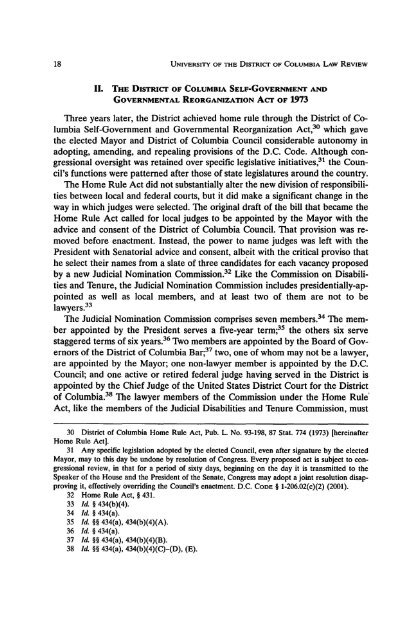Download Electronic Version - UDC Law Review
Download Electronic Version - UDC Law Review
Download Electronic Version - UDC Law Review
Create successful ePaper yourself
Turn your PDF publications into a flip-book with our unique Google optimized e-Paper software.
18 UNIVERSITY OF THE DISTRICf OF COLUMBIA LAW REVIEW<br />
II. THE DISTRIcr OF COLUMBIA SELF-GOVERNMENT AND<br />
GOVERNMENTAL REORGANIZATION Acr OF 1973<br />
Three years later, the District achieved home rule through the District of Columbia<br />
Self-Government and Governmental Reorganization Act,3° which gave<br />
the elected Mayor and District of Columbia Council considerable autonomy in<br />
adopting, amending, and repealing provisions of the D.C. Code. Although congressional<br />
oversight was retained over specific legislative initiatives,31 the Council's<br />
functions were patterned after those of state legislatures around the country.<br />
The Home Rule Act did not substantially alter the new division of responsibilities<br />
between local and federal courts, but it did make a significant change in the<br />
way in which judges were selected. The original draft of the bill that became the<br />
Home Rule Act called for local judges to be appointed by the Mayor with the<br />
advice and consent of the District of Columbia Council. That provision was removed<br />
before enactment. Instead, the power to name judges was left with the<br />
President with Senatorial advice and consent, alb~it with the critical proviso that<br />
he select their names from a slate of three candidates for each vacancy proposed<br />
by a new Judicial Nomination Commission. 32 Like the Commission on Disabilities<br />
and Tenure, the Judicial Nomination Commission includes presidentially-appointed<br />
as well as local members, and at least two of them are not to be<br />
lawyers. 33<br />
The Judicial Nomination Commission comprises seven members. 34 The member<br />
appointed by the President serves a five-year term;35 the others six serve<br />
staggered terms of six years. 36 Two members are appointed by the Board of Governors<br />
of the District of Columbia Bar;37 two, one of whom may not be a lawyer,<br />
are appointed by the Mayor; one non-lawyer member is appointed by the D.C.<br />
Council; and one active or retired federal judge having served in the District is<br />
appointed by the Chief Judge of the United States District Court for the District<br />
of Columbia. 38 The lawyer members of the Commission under the Home Rule'<br />
Act, like the members of the Judicial Disabilities and Tenure Commission, must<br />
30 District of Columbia Home Rule Act, Pub. L. No. 93-198, 87 Stat. 774 (1973) [hereinafter<br />
Home Rule Act].<br />
31 Any specific legislation adopted by the elected Council, even after signature by the elected<br />
Mayor, may to this day be undone by resolution of Congress. Every proposed act is subject to congressional<br />
review, in that for a period of sixty days, beginning on the day it is transmitted to the<br />
Speaker of the House and the President of the Senate, Congress may adopt a joint resolution disapproving<br />
it, effectively overriding the Council's enactment. D.C. CODE § 1-206.02(c)(2) (2001).<br />
32 Home Rule Act, § 431.<br />
33 [d. § 434(b)(4).<br />
34 [d. § 434(a).<br />
35 [d. §§ 434(a), 434(b)(4)(A).<br />
36 [d. § 434(a).<br />
37 [d. §§ 434(a), 434(b)(4)(B).<br />
38 [d. §§ 434(a), 434(b)(4)(C)-(D), (E).














